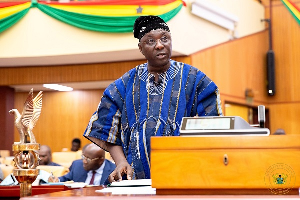Jibran Qureishi, Head of Africa Regions, Economics Research at Standard Bank, has expressed optimism over Ghana’s economic indicators following the presentation of the Mid-Year Budget Review to the Parliament of Ghana.
Mr. Qureishi said this when he shared insights on the Mid-Year Budget Review with clients and customers of Stanbic Bank Ghana.
According to Jibran Qureishi, “Ghana, like many other nations, is emerging from the twin shocks of the COVID-19 pandemic and the Russia-Ukraine crisis, which have significantly impacted global inflation expectations and economic stability. However, despite these challenges, Ghana is showcasing resilience and a promising path to recovery.”
“Countries such as Uganda, Malawi, Zambia, and Ethiopia have seen their economic growth falter, unable to return to pre-pandemic levels due to their debt challenges. In contrast, Ghana has shown signs of recovery and resilience. The country’s GDP growth has been revised to 3.1% from an initial 2.8%, though such figures are subject to fluctuations as new data becomes available,” he added.
Jibran Qureishi noted that the positive outcome is due to the increased gold production and the restructuring of the country’s external debts.
He said, “The gold sector has been a significant driver of this growth, with increased production and rising international prices contributing positively to the economy. The completion of external debt restructuring has also been crucial, restoring macroeconomic stability and preventing the Ghanaian cedi from depreciating further.
He continued “Timely external debt restructuring has been pivotal for Ghana. Without it, the cedi would have continued to weaken, exacerbating inflation and hindering economic growth. The restructuring has allowed Ghana to maintain a current account surplus, driven by reduced debt servicing and a decline in imports due to high inflation and interest rates.”
The Standard Bank researcher, however, noted that the current account surplus is expected to decrease as imports rise with falling inflation. He mentioned that by late 2025 or early 2026, Ghana might experience a current account deficit. On the performance of the economy as a whole, Jibran Qureishi said “Ghana’s mid-year budget review presents a mixed picture.
“The fiscal deficit has been revised down to 4.2% of GDP from 4.8%, driven by optimistic revenue collection expectations. However, the first half of the year saw lower-than-expected revenue collections, raising questions about the feasibility of these projections.”
The reduction in the fiscal deficit, Mr. Qureishi said, is partly due to lower external debt amortization, allowing for increased net foreign financing. For him, the shift is essential as the domestic bond market remains illiquid, limiting longer-term borrowing options and the government must focus on stimulating interest and liquidity in the domestic bond market to support economic activity.
Ghana’s mid-year budget review reflects a complex but cautiously optimistic economic trajectory. The nation’s recovery is sustained by strategic debt restructuring, robust export sectors, and international financial support.
Nevertheless, maintaining fiscal discipline and advancing a conducive environment for investment and economic growth are crucial for sustaining this recovery. As Ghana navigates these challenges, the commitment to sound economic policies and structural reforms will be key to securing a stable and prosperous future.
Jibran is an economist and fixed-income & currency strategist at the Standard Bank Group. He is currently the Head of Africa Research and FIC Strategy. He provides operational and strategic leadership to a team that has members in multiple geographic locations across the continent.
Business News of Wednesday, 14 August 2024
Source: thebftonline.com













